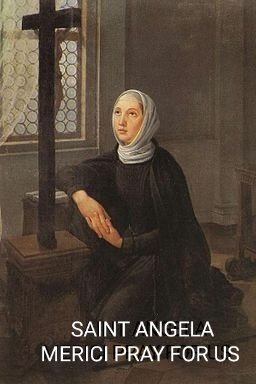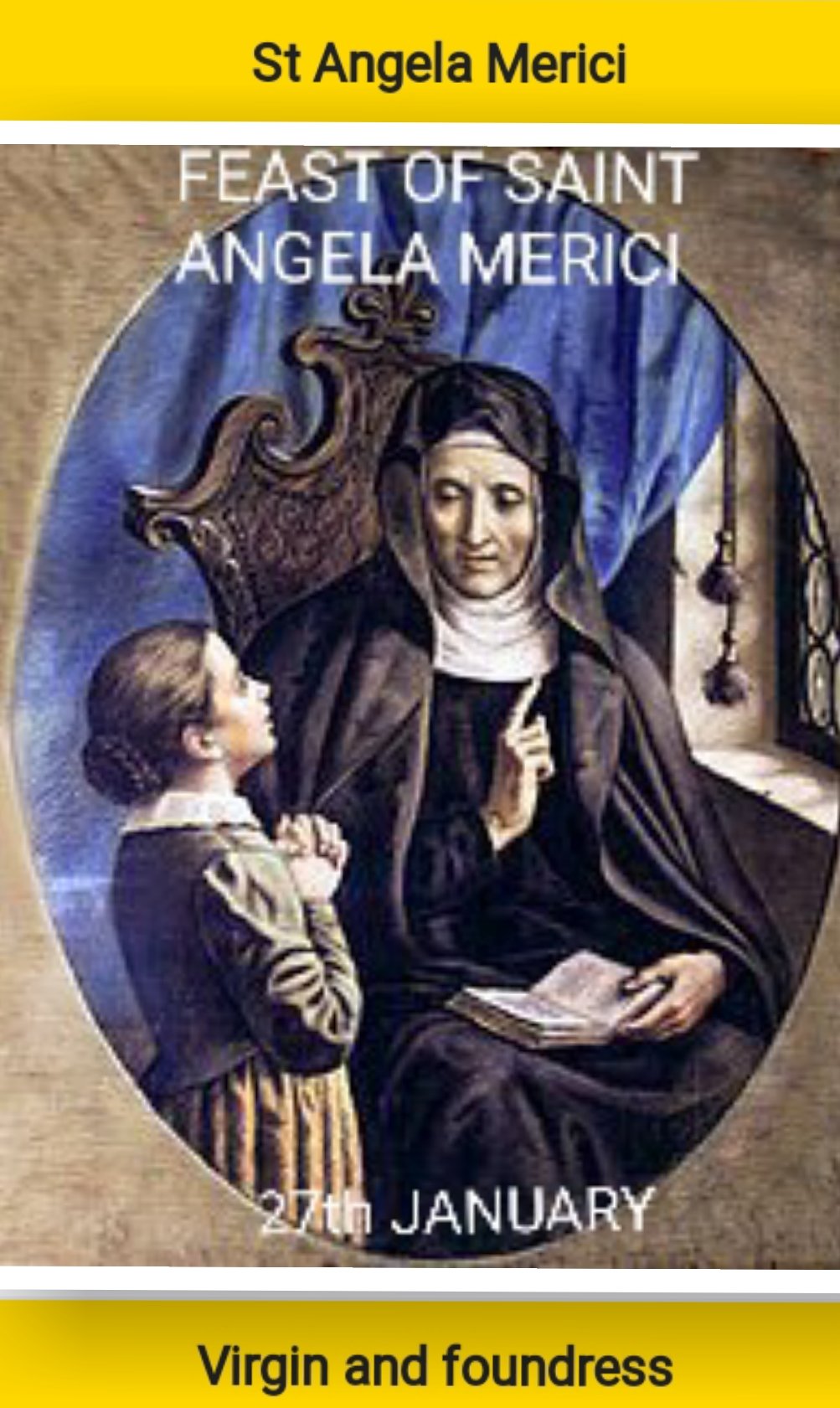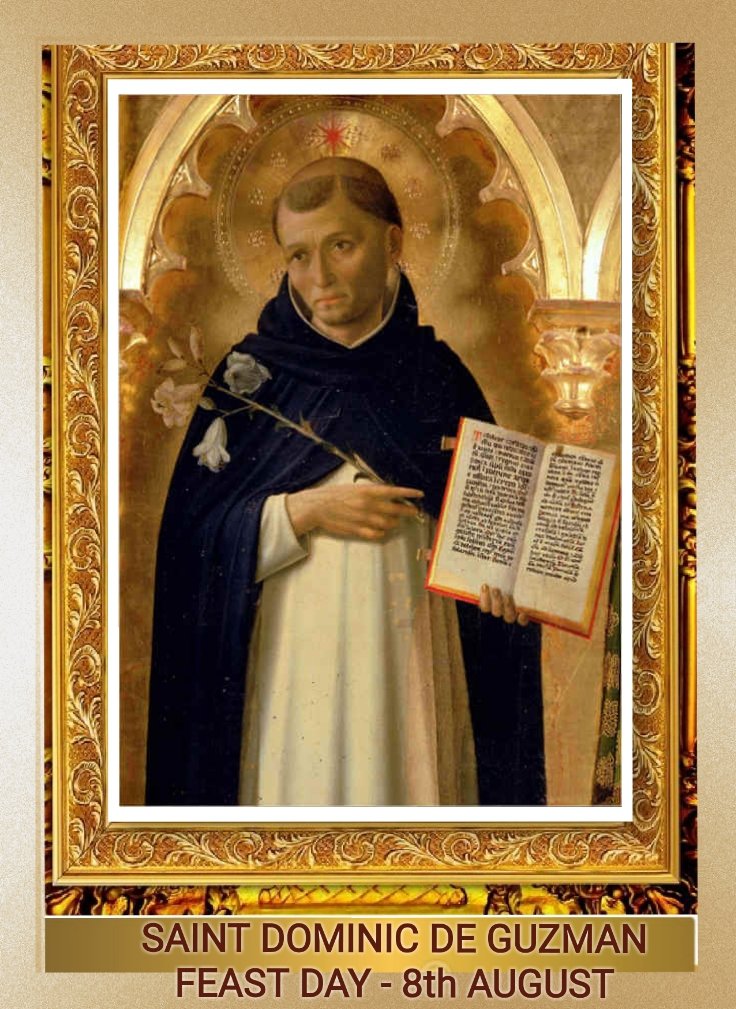FEAST OF SAINT ANGELA MERICI
FEAST DAY – 27th JANUARY
Angela Merici or Angela de Merici, 21 March 1474 – 27 January 1540, was an Italian religious educator, who is honored as a saint by the Roman Catholic Church. She founded the Company of St. Ursula in 1535 in Brescia, in which women dedicated their lives to the service of the Church through the education of girls. From this sprang the monastic Order of Ursulines, whose nuns established places of prayer and learning throughout Europe and around the world, notably in North America.
Although not common, some older images and statues of St. Francis of Assisi show him balancing three orbs on his shoulders. They appear to be globes, heavenly realms, or the earth, the moon, and the sun. But the three orbs represent the three orders in the Franciscan family, the first order for men, the second order for women, and the third order for the laity who desired to live by the Franciscan rule. Today’s saint, Angela Merici, was a third order Franciscan, who followed a strict rule of Franciscan life outside of a convent.
Merici was born in 1474 on a farm near Desenzano del Garda, a small town on the southwestern shore of Lake Garda in Lombardy, Italy. She and her older sister, Giana Maria, were left orphans when she was ten years old. They went to live with their uncle in the town of Salò. Young Angela was very distressed when her sister suddenly died without receiving the Last Rites of the Church and prayed that her sister’s soul rest in peace. In a vision she received a response that her sister was in heaven in the company of the saints. She joined the Third Order of St. Francis around that time. People began to notice Angela’s beauty and particularly to admire her hair. As she had promised herself to God, and wanted to avoid the worldly attention, she dyed her hair with soot.
Merici’s uncle died when she was twenty years old and she returned to her home in Desenzano, and lived with her brothers, on her own property, given to her in lieu of the dowry that would otherwise have been hers had she married. She later had another vision that revealed to her that she was to found an association of virgins who were to devote their lives to the religious training of young girls. This being a success, she was invited to start another school in the neighboring city of Brescia.
Angela’s holiness, mystical experiences, and leadership skills ultimately led her beyond her Franciscan commitment to found her own community of “virgins in the world” dedicated to the education of vulnerable girls, or, in common parlance, at risk youths. She placed the community under the patronage of St. Ursula. The community, after Angela’s death, was formally recognized as the Ursulines, and gained such renown for their schools that they came to be known as the female Jesuits.
St. Angela saw the risk that uneducated girls in her own region of northern Italy would end up being abused sexually or financially and sought to counter this possibility through education. She gathered a like minded group of virgins around her into a “company,” a military word also used by St. Ignatius in founding his “Company of Jesus” around the same time. Saint Angela organized her city into districts which reported to a “colonel” who oversaw the education and general welfare of the poor girls under their care. Saint Angela’s cooperators did not understand their dedicated virginity as a failure to find a husband or a rejection of religious life in a convent. They emulated the early Christian orders of virgins as spouses of Christ, serving children of their Beloved.
Living in the first part of the 16th century, St. Angela was far ahead of her time. Teaching orders of nuns became normative in the Church throughout the centuries, staffing Catholic schools throughout the world. But nuns did not always do this. It had to start with someone, and that someone was today’s saint. Bonds of faith, love of God, and a common purpose knitted her followers together into a religious family that served the spiritual and physical welfare of those who no one else cared about. Women make homes. Men just live in them. Saint Angela sought to change society one woman at a time by infusing every home with Christian virtue emanating from the heart of women.
She trained future wives, mothers, and educators in their youth, when they were still able to be formed. According to legend, in 1524, while traveling to the Holy Land, Merici suddenly became blind when she was on the island of Crete. Despite this, she continued her journey to the Holy Land and was ostensibly cured of her blindness on her return, while praying before a crucifix, at the same place where she had been struck with blindness a few weeks earlier. In 1525, she journeyed to Rome in order to gain the indulgences of the Jubilee Year then being celebrated. Pope Clement VII, who had heard of her virtue and success with her school, invited her to remain in Rome. Merici disliked notoriety, however, and soon returned to Brescia.
On 25 November 1535, Merici gathered with 12 young women who had joined in her work in a small house in Brescia near the Church of St. Afra, where together they committed themselves in the founding of the Company of St. Ursula, placed under the protection of the patroness of medieval universities. Her goal was to elevate family life through Christian education of future wives and mothers. They were the first teaching order of women religious.
Merici taught her companions to serve God, but to remain in the world, teaching the girls of their own neighborhood, and to practice a religious form of life in their own homes. The members wore no special habit and took no formal religious vows. Merici wrote a Rule of Life for the group, which specified the practice of celibacy, poverty and obedience in their own homes. The Ursulines opened orphanages and schools. On 18 March 1537 she was elected Mother/ Mistress of the group. The Rule she wrote was approved in 1544 by Pope Paul III.
When Merici died in Brescia on 27 January 1540, there were 24 communities of the Company of St. Ursula serving the Church through the region. Her body was clothed in the habit of a Franciscan tertiary and was interred in the Church of Sant’Afra. The traditional view is that Merici believed that better Christian education was needed for girls and young women, to which end she dedicated her life. Querciolo Mazzonis argues that the Company of St. Ursula was not originally intended as a charitable group specifically focused on the education of poor girls, but that this direction developed after her death in 1540, sometime after it received formal recognition in 1546.
During her life, Merici had often prayed at the tombs of the Brescian martyrs at the Church of St. Afra in Brescia. She lived in small rooms attached to a priory of the Canons Regular of the Lateran. According to her wishes, after her death, she was interred in the Church of St Afra to be near the martyrs’ remains. There her body remained until the complete destruction of this church and its surrounding area by Allied bombing during the Second World War, on 2 March 1945, in which the parish priest and many townspeople died. The church and corresponding buildings were afterwards rebuilt, and reopened on 10 April 1954. The church was consecrated on 27 January 1956, with a new dedication to St. Angela Merici, while the Parish of St. Afra was transferred to the neighboring Church of St. Eufemia.
Merici was beatified in Rome on 30 April 1768, by Pope Clement XIII. She was later canonized on 24 May 1807 by Pope Pius VII. The Papal Bull of Pope Paul III in 1544 which recognized her community stated of St. Angela Merici: “She had such a thirst and hunger for the salvation and good of her neighbor that she was disposed and most ready to give not one, but a thousand lives, if she had had so many, for the salvation even of the least… with maternal love, she embraced all creatures…Her words…were spoken with such unheard of effectiveness that everyone felt compelled to say: ‘Here is God.’”
Merici was not included in the 1570 Tridentine Calendar of Pope Pius V because she was not canonized until 1807. In 1861, her feast day was included in the Roman Calendar – not on the day of her death, 27 January, since this date was occupied by the feast day of St. John Chrysostom. In 1955, Pope Pius XII assigned this date to the new feast of the Queenship of Mary. The celebration was ranked as a Double until 1960, when Pope John XXIII gave it the equivalent rank of Third-Class Feast. In the major 1969 reform of the liturgy, Pope Paul VI moved the feast, ranked as a Memorial, to her day of death, 27 January.
PRAYER
Lord God, you filled St. Angela Merici’s heart with a thirst to serve and to eradicate the suffering of her neighbor, a mission she followed all the days of her life, supporting and educating poor girls and women.
Infuse in our hearts that same love for which she left worldly joys to seek out the vulnerable and the forgotten. Help us to educate the ignorant and to share with the less fortunate, not only for their spiritual and material benefit but for our eternal salvation, in Jesus’ Name. Amen

Saint Angela Merici, pray for us to emulate you, spreading peace and joy in the hearts of our needy brethren. Amen






